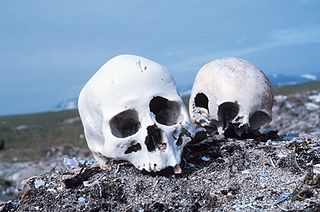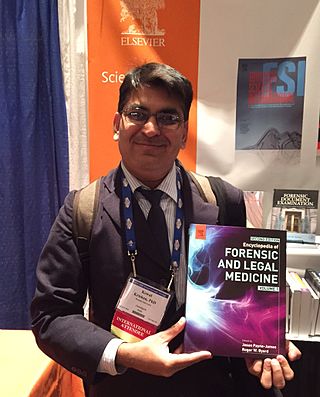
Forensic science, also known as criminalistics, is the application of science to criminal and civil laws. During criminal investigation in particular, it is governed by the legal standards of admissible evidence and criminal procedure. It is a broad field utilizing numerous practices such as the analysis of DNA, fingerprints, bloodstain patterns, firearms, ballistics, and toxicology.

Forensic pathology is pathology that focuses on determining the cause of death by examining a corpse. A post mortem examination is performed by a medical examiner or forensic pathologist, usually during the investigation of criminal law cases and civil law cases in some jurisdictions. Coroners and medical examiners are also frequently asked to confirm the identity of remains.

The Royal College of Physicians (RCP) is a British professional membership body dedicated to improving the practice of medicine, chiefly through the accreditation of physicians by examination. Founded by royal charter from King Henry VIII in 1518, as the College of Physicians, the RCP is the oldest medical college in England. It set the first international standard in the classification of diseases, and its library contains medical texts of great historical interest. The college is sometimes referred to as the Royal College of Physicians of London to differentiate it from other similarly named bodies.

Forensic dentistry or forensic odontology involves the handling, examination, and evaluation of dental evidence in a criminal justice context. Forensic dentistry is used in both criminal and civil law. Forensic dentists assist investigative agencies in identifying human remains, particularly in cases when identifying information is otherwise scarce or nonexistent—for instance, identifying burn victims by consulting the victim's dental records. Forensic dentists may also be asked to assist in determining the age, race, occupation, previous dental history, and socioeconomic status of unidentified human beings.

The medical examiner is an appointed official in some American jurisdictions who is trained in pathology that investigates deaths that occur under unusual or suspicious circumstances, to perform post-mortem examinations, and in some jurisdictions to initiate inquests.

Medical jurisprudence or legal medicine is the branch of science and medicine involving the study and application of scientific and medical knowledge to legal problems, such as inquests, and in the field of law. As modern medicine is a legal creation, regulated by the state, and medicolegal cases involving death, rape, paternity, etc. require a medical practitioner to produce evidence and appear as an expert witness, these two fields have traditionally been interdependent.
Professor Patrice Mangin is a widely published forensic pathologist and toxicologist, director of the University Center of Legal Medicine in Lausanne and Geneva, Switzerland.
Cadaveric spasm, also known as postmortem spasm, instantaneous rigor mortis, cataleptic rigidity, or instantaneous rigidity, is a rare form of muscular stiffening that occurs at the moment of death and persists into the period of rigor mortis. Cadaveric spasm can be distinguished from rigor mortis as the former is a stronger stiffening of the muscles that cannot be easily undone, while rigor mortis can.

Law and Human Behavior is a bimonthly academic journal published by the American Psychology–Law Society. It publishes original empirical papers, reviews, and meta-analyses on how the law, legal system, and legal process relate to human behavior, particularly legal psychology and forensic psychology. The current editor-in-chief is Bradley D. McAuliff. Past editors have been Margaret Bull Kovera, Brian Cutler, Richard Wiener, Ronald Roesch, Michael J. Saks, and Bruce Sales.

Harry Thomas Edwards is an American jurist and legal scholar. He is currently a Senior United States Circuit Judge and chief judge emeritus of the United States Court of Appeals for the District of Columbia Circuit in Washington, D.C., and a professor of law at the New York University School of Law.

The Journal of Forensic Sciences (JFS) is a bimonthly peer-reviewed scientific journal is the official publication of the American Academy of Forensic Sciences, published by Wiley-Blackwell. It covers all aspects of forensic science. The mission of the JFS is to advance forensic science research, education and practice by publishing peer-reviewed manuscripts of the highest quality. These publications will strengthen the scientific foundation of forensic science in legal and regulatory communities around the world.
Forensic nursing is defined as the application of the nursing process to public or legal proceedings, and the application of forensic health care in the scientific investigation of trauma and/or death related to abuse, violence, criminal activity, liability, and accidents.
The IEEE Transactions on Information Forensics and Security is a scientific journal published by the IEEE Signal Processing Society. The journal is co-sponsored by several of the subject societies that make up the IEEE: IEEE Communications Society, IEEE Computational Intelligence Society, IEEE Computer Society, IEEE Engineering in Medicine and Biology Society and the IEEE Information Theory Society
John Obafunwa is a Nigerian medical expert, pathologist, lawyer, author and former Vice-Chancellor of Lagos State University.

Idupuganti Bhooshana Rao was a leading figure in forensic medicine in India. He was the Founding-President of the Indian Academy of Forensic Medicine established in 1972. He was born in Dornakal, Andhra Pradesh, India.

The American Journal of Forensic Medicine and Pathology is a peer-reviewed scientific journal published by Lippincott Williams & Wilkins covering research on forensic medicine and forensic pathology. The current editor-in-chief is D. Kimberley Molina.
Pakkiriswamy Chandra Sekharan was an Indian forensic expert, writer and a former director of the Department of Forensics Sciences of the Government of Tamil Nadu. He was best known for his contributions in the investigations in the Rajiv Gandhi assassination case.

Dr. Kewal Krishan, an Indian forensic anthropologist, is a Professor of physical anthropology and former Chair of Department of Anthropology at Panjab University, Chandigarh, India. He has contributed to the development of forensic anthropology in India. He is one of the very few forensic anthropology experts of the nation.
Medicine, Science and the Law is a quarterly peer-reviewed medical journal covering forensic medicine and science. It was established in 1960 and was originally published by Sweet & Maxwell; it is now published by SAGE Publications. It has been the official journal of the British Academy of Forensic Sciences since the journal and Academy were both established. The editor-in-chief is Peter Vanezis. According to the Journal Citation Reports, the journal has a 2016 impact factor of 0.689, ranking it 90th out of 147 journals in the category "Law" and 12th out of 15 journals in the category "Medicine, Legal".
International Journal of Legal Medicine is a peer-reviewed scientific journal aims to improve the scientific resources which are used in the elucidation of crime and forensic applications. It was founded in Germany in 1990 and is the official journal of the International Academy of Legal Medicine. The journal is published by Springer Science+Business Media, as of 2022 editors in chiefs are Heidi Pfeiffer and Andreas Schmeling.










